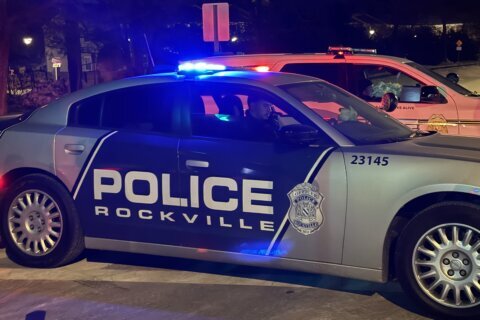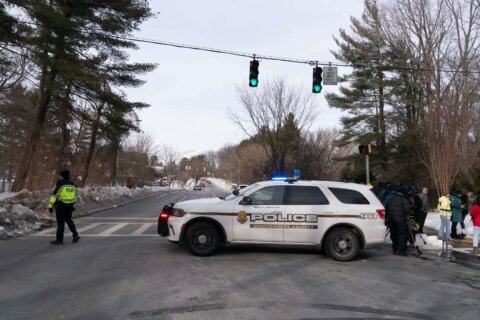Knives placed near playgrounds, shattered windows, fences defaced with antisemitic graffiti, late-night unwelcome visitors — they are just some of the incidents described by the leaders of nonprofit organizations in Montgomery County, Maryland, that say they need help to prevent hate crimes.
“I moved here to Montgomery County, to this beautiful county, to think we could have a life free of hate,” Ayelet “Ellie” Lichtash said during a news conference Monday, her voice quivering with emotion.
“Seventeen years ago, hate crime was anecdotal — a window broken at our facility or someone would scribble something … In the last four years, our school has experienced a tremendous increase in hate.”
Lichtash runs Alef Bet Montessori in North Bethesda, yet she applied for a county grant to help offset the cost of hiring security to ensure the students, attending pre-K through 6th grade, can get to and from the school safely. She said she is still emotionally recovering from the hateful words of two visitors who came to an open house at the school in January 2019.
“They screamed, ‘You’re Jewish, get out of here! You’re going to make all of us Jewish!’ It took me a half hour to get these people out of the building and calm myself,” Lichtash said.
In another incident, tools, including knives and a saw, were found on the perimeter on the campus, which Lichtash said she believes were intentionally dropped there.
Her staff now conducts a daily sweep of the grounds to ensure a child isn’t injured by an item that isn’t supposed to be there.
“Obviously those haters want to make our school unsafe for children and that’s why they did it … Since that day, we’ve put some cameras for security, and I invited the neighbors to come to see the security that we have and these things have stopped. So cameras have an effect on people,” she said.
Lichtash acknowledged to the room full of other grant recipients that her situation was not unlike theirs. As they each took the podium at the County Executive’s building in Rockville, a dozen speakers echoed the sentiment of feeling under threat.
Ravir Singh Floura thanked the county leadership for helping him patch up security at Guru Nanak Foundation of America, where hundreds of Sikhs worship each Sunday. The center was intentionally designed with huge glass windows and multiple entries to allow greater access to the community, which has now become a security concern.
Overall, the county received 108 applications for its nonprofit security grant program this year. Of those applications, more than 50% said they have experienced a hate crime before, said Luke Hodgson, director of the county’s Office of Emergency Management and Homeland Security.
“Recently a Jewish man was assaulted at a Giant in Gaithersburg after asking a group of teens and young adults to stop engaging in unwelcome behavior,” said Ron Halber, Chair of the Jewish Community Relations Council of Greater Washington.
“During the assault, a reference was made to Kanye West, once again demonstrating the ability of social media to be a vehicle of hatred and incitement,” Halber said.
This incident comes just weeks after antisemitic graffiti was discovered along Bethesda’s Trolley Trail and at Walt Whitman High School. Along with the Jewish Federation, the JCRC is offering $2,500 per incident to any tipster whose information leads to the arrest and indictment of those responsible.
“The uncomfortable thing is, I knew what this was when I was growing up. And then there was a brief period of time when all this seemed to subside and people didn’t talk like this and act like this. And now we’re back in a world where people are perfectly free to hate,” said County Executive Marc Elrich.
He recalled his experiences as a boy in the 1950 and ’60s, when he said his 10-year-old friends were spouting antisemitic rhetoric. Hate, he said, is learned at home.
“It’s a sad commentary on where this is, but it’s something we have to fight. People have got to stop being silent in the face of what people say,” Elrich said. “If a friend, a neighbor or an acquaintance, or just some crazy person walking around the grocery store says something that’s not appropriate, people have to have the courage to say, ‘You shouldn’t talk that way and that’s not acceptable.’ If people don’t hear that, it just becomes part of the normal chatter.”
The majority of the 91 nonprofits that qualified for the funding are houses of worship. But unlike the federal and state grants available to nonprofits which are mostly used to cover capital expenses, the county’s grant is promoted as a source for operational improvements.
Lichtash is using the funds to afford a security guard at her school. Floura is planning on conducting a new security assessment. The grant money, which varies based on the recipient, can also be used to install or improve security cameras and train staff.
Many speakers, including the county executive, mentioned that the $800,000 is needed elsewhere.
“It is really unfortunate that we’re doing this. If you think about this money and where we could have put it — into feeding programs in Montgomery County or rental assistance … if everyone were just acting civilized,” Elrich said.
Police and fire and rescue are holding a seminar to instruct faith leaders on how to minimize the risk of violent intruders and how to respond if there is an attack. Registration is required for the Feb. 15 evening event, Securing our Houses of Worship, which can be found by contacting the Montgomery County Faith Community Advisory Council.
Editor’s Note: This story has been changed to clarify how recipients can spend federal, state, and county grant funding.








